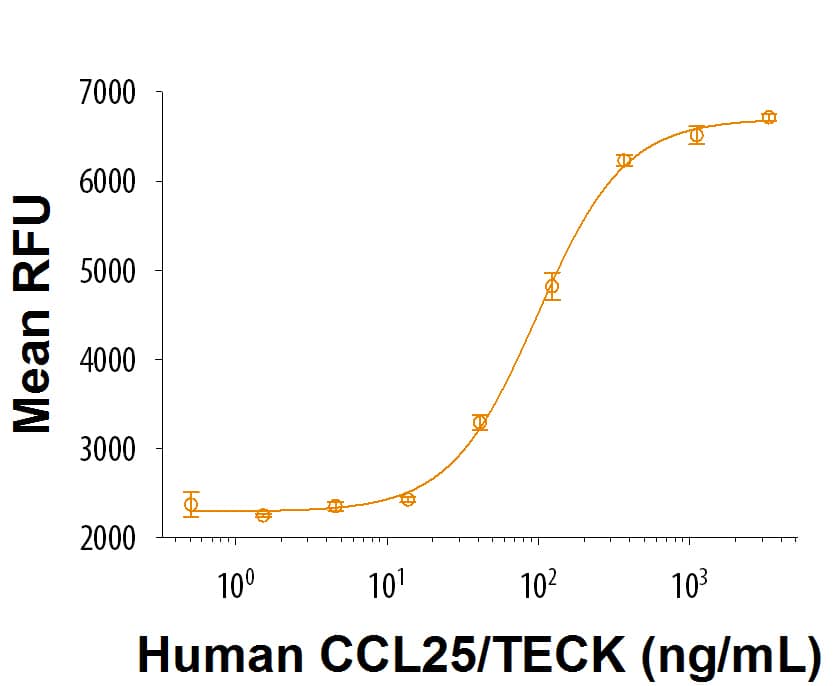Recombinant Human CCL25/TECK Protein
R&D Systems, part of Bio-Techne | Catalog # 9046-TK

Key Product Details
Product Specifications
Source
Gln24-Leu150
Purity
Endotoxin Level
N-terminal Sequence Analysis
Predicted Molecular Mass
SDS-PAGE
Activity
The ED50 for this effect is 30-180 ng/mL.
Scientific Data Images for Recombinant Human CCL25/TECK Protein
Recombinant Human CCL25/TECK Protein Bioactivity
Recombinant Human CCL25/TECK (Catalog # 9046-TK) chemoattracts the BaF3 pro-B cells transfected with human CCR9. The ED50 for this effect is 30-180 ng/mL.Formulation, Preparation and Storage
Carrier Free
What does CF mean?CF stands for Carrier Free (CF). We typically add Bovine Serum Albumin (BSA) as a carrier protein to our recombinant proteins. Adding a carrier protein enhances protein stability, increases shelf-life, and allows the recombinant protein to be stored at a more dilute concentration. The carrier free version does not contain BSA.
What formulation is right for me?In general, we advise purchasing the recombinant protein with BSA for use in cell or tissue culture, or as an ELISA standard. In contrast, the carrier free protein is recommended for applications, in which the presence of BSA could interfere.
Carrier: 9046-TK
| Formulation | Lyophilized from a 0.2 μm filtered solution in Acetonitrile and TFA with BSA as a carrier protein. |
| Reconstitution | Reconstitute at 250 μg/mL in 4 mM HCl. |
| Shipping | The product is shipped at ambient temperature. Upon receipt, store it immediately at the temperature recommended below. |
| Stability & Storage | Use a manual defrost freezer and avoid repeated freeze-thaw cycles.
|
Carrier Free: 9046-TK/CF
| Formulation | Lyophilized from a 0.2 μm filtered solution in Acetonitrile and TFA. |
| Reconstitution | Reconstitute at 250 μg/mL in 4 mM HCl. |
| Shipping | The product is shipped at ambient temperature. Upon receipt, store it immediately at the temperature recommended below. |
| Stability & Storage | Use a manual defrost freezer and avoid repeated freeze-thaw cycles.
|
Background: CCL25/TECK
References
- Vicari, A.P. et al. (1997) Immunity 7:291.
- Bowman, E.P. et al. (2002) J. Exp. Med. 195:269.
- Kunkel, E.J. et al. (2000) J. Exp. Med. 192:761.
- Zaballos, A. et al. (1999) J. Immunol. 162:5671.
- Youn, B.-S. et al. (1999) Blood 94:2533.
- Uehara, S. et al. (2002) J. Immunol. 168:134.
- Costa, M.F.S. et al. (2012) Eur. J. Immunol. 42:1250.
- Svensson, M. et al. (2002) J. Clin. Invest. 110:1113.
- Amersi, F.F. et al. (2008) Clin. Cancer Res. 14:638.
- Johnson-Holiday, C. et al. (2011) Int. J. Oncol. 38:1279.
- Xu, S. et al. (2012) Stem Cells 30:266.
- Schmutz, C. et al. (2010) Arthritis Res. Ther. 12:R161.
- Wang, Y. et al. (2010) Cell. Mol. Immunol. 7:51.
- Alla, J.A. et al. (2010) J. Biol. Chem. 285:23496.
Alternate Names
Gene Symbol
UniProt
Additional CCL25/TECK Products
Product Documents for Recombinant Human CCL25/TECK Protein
Product Specific Notices for Recombinant Human CCL25/TECK Protein
For research use only
